
Mallorca, or Majorca, is the largest island in the Balearic Islands, which are part of Spain and located in the Mediterranean. The native language, as on the rest of the Balearic Islands, is Catalan, which is co-official with Spanish.

Palma de Mallorca, since December 2016 Palma, is the capital and largest city of the autonomous community of the Balearic Islands in Spain. It is situated on the south coast of Mallorca on the Bay of Palma. The Cabrera Archipelago, though widely separated from Palma proper, is administratively considered part of the municipality. As of 2018, Palma de Mallorca Airport serves over 29 million passengers per year.

Infanta Cristina of Spain is the younger daughter of King Juan Carlos I and Queen Sofía. As of 2015 she is sixth in the line of succession to the Spanish throne, after her brother King Felipe VI's children, her sister Elena, and Elena's children.
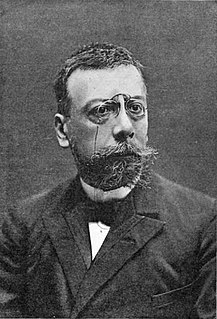
Àngel Guimerà, known also as Ángel Guimerá, was a Spanish Nobel-nominated writer in the Catalan language. His work is known for bringing together under romantic aspects the main elements of realism. It is considered one of the principal representatives of the so-called Renaixença, at the end of the nineteenth century.

Maria del Mar Bonet i Verdaguer is a Balearic singer from the island of Majorca.

Carme Riera Guilera is a novelist and essayist. She has also written short stories, scripts for radio and television and literary criticism. She holds a doctorate in Hispanic Philology and is a professor of Spanish literature at the Universitat Autònoma de Barcelona.
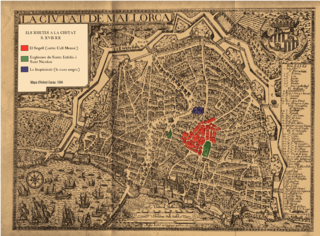
The Xuetes are a social group on the Spanish island of Majorca, in the Mediterranean Sea, who are descendants of Majorcan Jews that either were conversos or were Crypto-Jews, forced to keep their religion hidden. They practiced strict endogamy by marrying only within their own group. Many of their descendants observe a syncretist form of Christian worship known as Xueta Christianity.
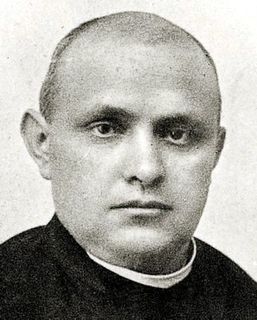
Father Antoni Maria Alcover i Sureda, also known as Mossèn Alcover was a modernist Majorcan writer, who wrote on a wide range of subjects including the Catholic Church, folklore and linguistics. He is chiefly associated with efforts to revive interest in the Catalan language and its dialects. Among his works was a Catalan-Valencian-Balearic dictionary.
Joaquín María Bover de Roselló was a Spanish writer and editor who wrote primarily in Spanish but also some poems in Catalan. Bover grew up on Majorca, with occasional stays in Madrid. He was an avid student of the Balearic Islands, writing several books about its geographical and historical aspects, as well as several studies on its writers and literature, such as his dictionary on Balearic writers. He also wrote inspirational poems and poems about local circumstance, as well as compiling a Mallorcan Catalan-Spanish dictionary.

The Conquest of the island of Majorca on behalf of the Christian kingdoms was carried out by King James I of Aragon between 1229 and 1231. The pact to carry out the invasion, concluded between James I and the ecclesiastical and secular leaders, was ratified in Tarragona on August 28, 1229. It was open and promised conditions of parity for all who wished to participate.
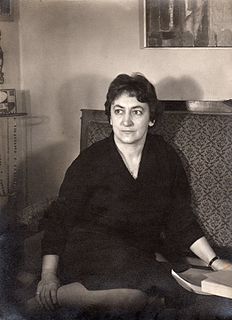
Maria Aurelia Capmany i Farnés was a Catalan novelist, playwright and essayist of Catalan descent. She was also a prominent feminist cultural and anti-Franco activist.
Aurora Díaz-Plaja i Contestí was a Catalan writer and librarian. Born in Barcelona, Díaz-Plaja also worked as a critic, journalist, lecturer, and translator during her career. She was the sister of the writers Ferran Díaz-Plaja i Contestí and Guillem Díaz-Plaja i Contestí. Her published work included topics such as library management, as well as stories for small children, in both Catalan and Spanish.
Núria Albó i Corrons is a Spanish writer, teacher, and politician. She is a Creu de Sant Jordi and Premi Vila de'Arenys laureate.
Llorenç Villalonga i Pons was a Spanish writer and psychiatrist. While he progressed in his medicine studies, Villalonga traveled to France, Barcelona and Murcia. He gained experience in psychiatry during his stay in France.
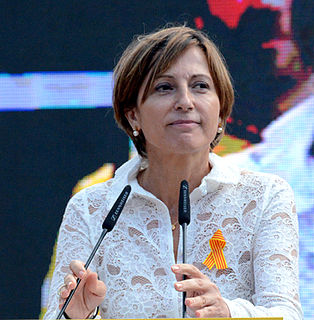
Maria Carme Forcadell i Lluís is a Spanish politician. She is the former President of the Parliament of Catalonia, as well as a Catalan high school teacher, known for her Catalan independence activism.
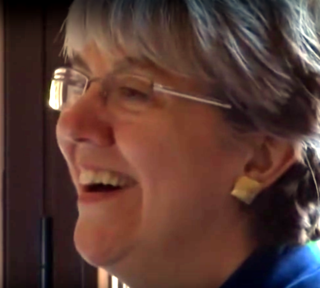
Maria Mercè Roca i Perich is a Catalan writer and politician. She was deputy to the Parliament of Catalonia for Republican Left of Catalonia, and currently serves as a councillor at the City Council of Girona for the same party.
Maria Verger Ventayol (1892–1983) was a Spanish archivist, librarian, and poet in Catalan and Spanish.
Maria Àngels Cardona i Florit was a biologist, ecologist and botanist from Menorca, who worked mainly in Barcelona.

Aina Calvo i Sastre, is a Spanish academic and politician, former Mayoress of Palma de Mallorca and current director of Spanish Agency for International Development Cooperation, since 10 July 2018.

The Armengol Government is the incumbent regional government of the Balearic Islands led by President Francina Armengol. It was formed in June 2015 after the regional election.
















